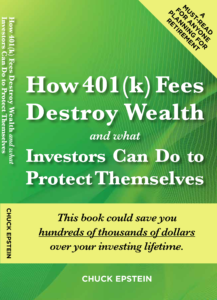Saving for retirement is hard enough, but now, the big guys in the financial services industry continue to add more barriers to make it harder for average Americans to implement a successful retirement strategy.
The latest examples include more lawsuits, regulatory challenges, and lobbying against adopting pro-investor advisory models that force advisors to give their clients honest answers. It sounds simple enough, but financial advisors don’t want to tell their clients, the people sipping coffee across from them in the meeting room, exactly how much they make in fees, commissions, and other incentives for promoting one investment over another.
Take this simple situation: an average American worker planning for retirement or purchasing a big-ticket item goes to their friendly neighborhood advisor and asks them to recommend mutual funds for their portfolio.
Simple enough.
Their financial advisor has two choices: They can follow what is known as the “fiduciary” standard. “Fiduciary,” a Latin term dating back to the Crusades, says financial advisers should put their customers’ interests ahead of their own. They also must be open and disclose “any actual or potential conflicts-of-interest an adviser may have, including any financial considerations that could affect the objectivity of an adviser’s advice. Investment advisers are governed by this standard,” according to attorney James Watkins, CEO/Managing Member at InvestSense.

But what if the financial advisor doesn’t want to tell their client everything? What if they get money or some other incentive from the investment manager or their firm to promote one fund over another? After all, there are 105 large-cap growth funds available, according to Morningstar, so which one is best suited for the client?
This poses a problem. However, the financial services industry, which promotes the interests of its advisors, planners, and, most importantly, has another response. This brings us to the second standard, “the so-called “suitability” standard, that allows a financial advisor to put their interests, as well as those of any broker-dealer they work with, before those of their customers.
“The suitability standard does not require a financial advisor to make the full disclosure required under the fiduciary standard, thereby allowing an adviser to conceal situations where an advisor is providing advice which is based on the financial benefit that the advisor will receive and is knowingly recommending actions that the advisor knows are not in the customer’s best interests at all. This is the standard that most stockbrokers operate under,” Watkins said.
So here is the situation: If you invest in a 401(k) or an individual or family portfolio, you can get honest or less-honest advice.
Ironically, you pay more for the less honest advice since you are usually charged a higher fee. If this happens, you should ensure your advisor takes you to steak dinners weekly.
However, there are two other problems: First, when you pay for advice under the suitability standard, you will invariably invest in an actively managed fund. These funds are sold using a few hot buttons: the manager is a great stock picker and can bench press his weight. Active funds are handy and can quickly respond to any market gyration to buffer the losses on the downside and move faster to capture them on the upside. Studies say this is untrue, but the salespeople continue using the old pitch.
So, how is one firm handling the problem of presenting less-than-honest advice?
“LPL Financial, the country’s largest independent broker-dealer, has asked the Securities and Exchange Commission (SEC) to make modifications to its proposed broker conduct standard, which one RIA advocate argues could ‘emasculate’ its requirements that brokers mitigate or eliminate their conflicts of interest,” according to one news story in an industry publication. That is strong language from LPL and indicates how much money is at stake if their advisers forego their many streams of undisclosed revenues from product sales.
When I worked in the industry, the internal wholesalers would cherry-pick data showing how our funds would rebound faster than some other laggard. This “time to recovery” chart was used against enemy funds A, B, and C to make our funds look good, but it was often too short-term to be valid.

Worse, they intentionally avoided the argument that passively managed index funds have consistently outperformed actively managed funds in almost every academic study.
Asking Advisors to Earn Their Money
Aside from just picking mutual funds, advisors make asset allocation and portfolio optimization decisions. There have been considerable advances in automating this process (the rise of robo-advisors, for instance) that can make it harder for investors to suffer excessive market losses. But suppose you are a client with an advisor working under the suitability standard. Your advisor should explain how your different stock and bond investments behave in declining and appreciating markets. To do this honestly, your advisor should adopt the fiduciary standard.
There is overwhelming research regarding index or passively managed funds versus actively managed mutual funds. As an attorney and fiduciary advocate, James Watkins of Investsense explains in this post:
“Contrary to popular belief, actively managed funds, on average, have tended to underperform a broad market benchmark in bear and bull markets. (1) Various studies have concluded that
- “Approximately eighty-five percent of actively-managed mutual funds underperform their relevant index over the long-term ;(2)
•” Contrary to popular belief, actively managed funds, on average, have tended to underperform a broad market benchmark in bear and bull markets. They have done so inconsistently despite the opportunity for active managers to add value during bear markets. (3)
• “A similar study by Standard & Poor’s analyzing two recent five-year market cycles, 1999 to 2003 and 2004 to 2008, found that corresponding S&P indices outperformed most actively-managed funds in all nine domestic equity style boxes. (4)
• “A study by the Schwab Center for Investment Research reported that:
(1) Index funds outperformed actively managed funds in 55% of the down markets
(2) In the worst downturns, defined as declines of 10% or more, index funds
outperformed actively managed funds 75% of the time.
(3) In the most prolonged downturns, defined as declines of 5 consecutive months or longer,
index funds outperformed actively managed funds 100% of the time. (5)”
Many Advisors Don’t Want Your Money
Finally, the furious and rabid Republican-led challenge to whether financial advisors should be honest with their customers has another side. If the advisors cannot earn enough from you in commissions and fees, they don’t want you as a client. At a Market Counsel Summit industry convention held in December 2018, the president of the Financial Services Institute, Dale Brown, argued that investors with a $50,000 portfolio could not get the advice needed to protect their portfolios in a bear market. Brown said the current suitability standard won’t generate enough commissions to make it worthwhile to engage people with “only” $50,000 to invest.
According to an article by Ian Wenik on the Summit, a few speakers “wrestled with the fact that the high financial barrier to accessing advice from an RIA complicates matters. A request for a show of hands from advisors (in the audience) who accepted $100,000 standalone accounts yielded only two takers.”
Read that again. While not scientific, only a few financial advisors in the audience indicated they would be interested in working with investors that “only” had $100,000 in assets.
So, if you think saving for retirement is complicated, that is only the first step. The Republicans and the financial services lobby have reversed any semblance of the fiduciary standard because it interferes with the industry’s ability to make lots of money. (For more about how fees hurt investors, see the book How 401(k) Fees Destroy Wealth.)
This leaves us with the bigger question: Who advocates for the average investor in your state or Washington, D.C. today?
If you can think of anyone, let me know.
But There is Good News
So, if an advisor says your $100,000 portfolio is too puny for him to make money, there is good news. There are registered investment advisors (RIAs) who have a fiduciary obligation to their clients. This means they are supposed to put your interests ahead of their own by suggesting the best products and strategies geared toward your needs. This sounds simple enough, but be selective when choosing an RIA. Investigate their firm and their disciplinary record from the SEC.
RIAs are the best alternative to advisors who want extra, often undisclosed, compensation. And until the financial services industry and the Republicans are forced to prioritize investor interests, caveat emptor.
Citations:
- Christopher B. Philips, “The Active-Passive Debate: Bear Market Performance,” Vanguard Investment Commentary (March 27, 2009)
2. Charles D. Ellis, Winning the Loser’s Game: Timeless Strategies for Successful Investing, 5th ed. (New York, NY: McGraw/Hill, 2010), 45, 139
3. Christopher B. Philips, “Do Active Managers Outperform in Bear Markets,” Vanguard Perspectives, Spring-Summer 2009
4. “Active Management Myths,” S&P Indices Practice Essentials/SPIVA 101
5. “Index or Actively Managed Equity Mutual Funds: Which Way to Go In A Down Market,” Schwab Center for Investment Research, July 2001.











